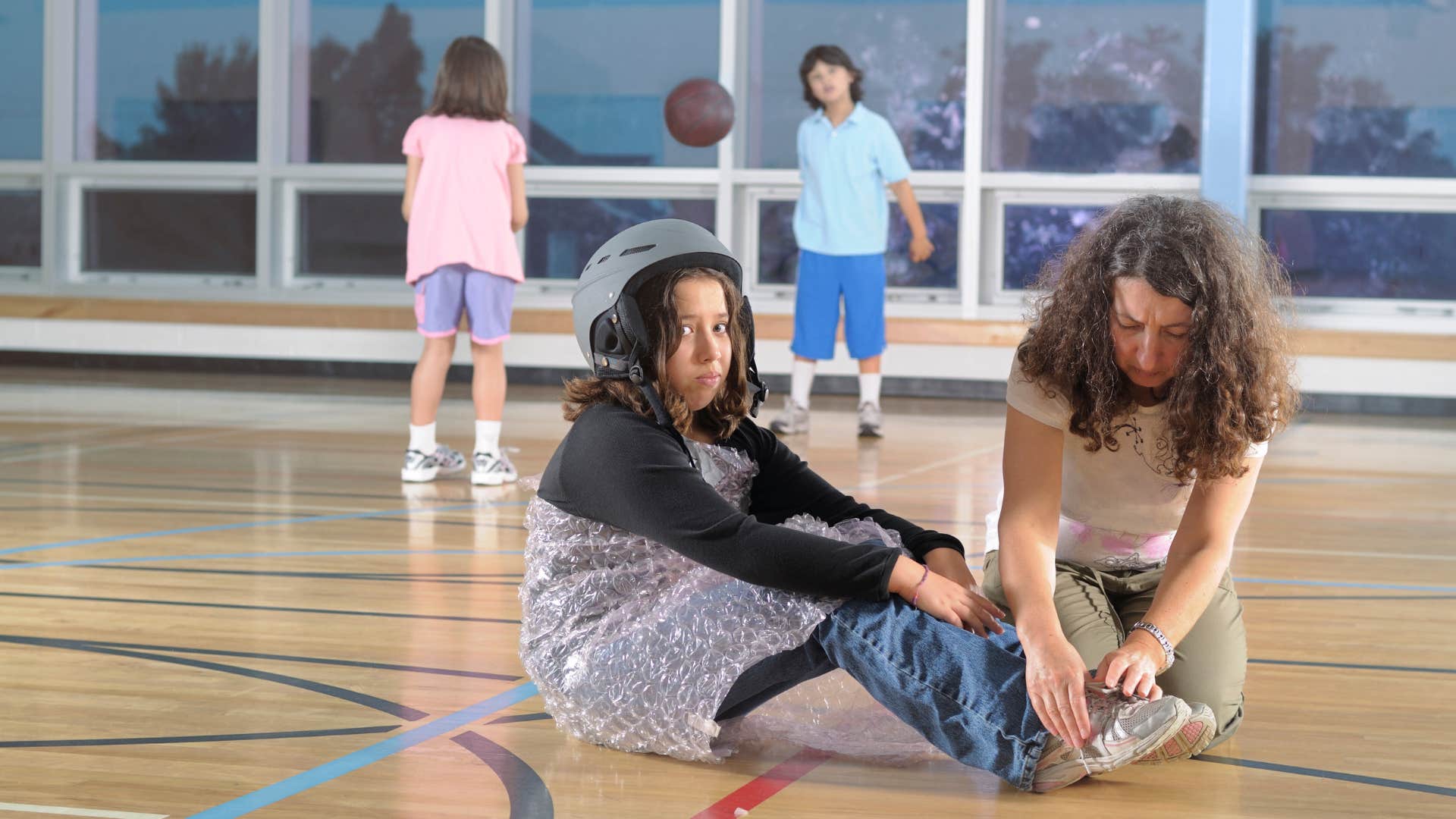11 Things Millennial Parents Do That Boomers Find Deeply Concerning
The older generation is giving millennials some serious side-eye over their parenting skills (or lack thereof).
 YAKOBCHUK VIACHESLAV / Shutterstock
YAKOBCHUK VIACHESLAV / Shutterstock Every generation does parenting in its own unique way, but the differences in rearing children between millennials and baby boomers are worlds apart. Boomers raised their kids in the tough love era with the strictest discipline, barely any screen time (because it wasn't an option yet), and an expectation that they learn independence early on. Now that their kids are parents themselves, there are many things millennial parents do that boomers find deeply concerning.
Millennials are raising kids in a tech-driven, emotionally aware society, so naturally, their approach illustrates a shift in values that sometimes leaves boomer grandparents at a loss for words. They often find millennial parents to be overly permissive and unserious. From how they feed their children to how they discipline them and the amount of autonomy they allow, many of the choices millennial moms and dads make cause older folks to raise an eyebrow.
Here are 11 things millennial parents do that boomers find deeply concerning
1. Treating their children as equals
 Milan Radulovic's Images via Canva
Milan Radulovic's Images via Canva
Remember being told to stay in your place as an adolescent? You were expected to be seen and not heard and to keep your nose out of grown folks' affairs. Times have changed, and millennial parents don't exactly have the same boundaries. They prioritize emotional intelligence and open communication, so they speak to their kids as if they are mini adults. Whether baby boomers like it or not, millennials believe their little ones deserve to be seen and heard.
While boomers kept a strict household hierarchy of authority, millennials parent more like they are part of a democracy where everyone has an equal vote. They believe that every person's voice matters, even if they are still a minor. This is a clear shift from their childhoods, where they were expected to follow instructions without question.
2. Letting screens babysit
 Helena Lopes from Pexels via Canva
Helena Lopes from Pexels via Canva
Boomers have some nerve being concerned about millennials' kids sitting in front of the TV or laptop all day. They didn't have that option when they were raising us, but if they had, it would most definitely have been utilized. Instead, we were Gen X latchkey kids, independent and self-reliant. Our parents taught us to babysit ourselves, and we learned valuable life skills because of it.
Yes, too much screen time isn't good for anyone, and for baby boomers, sending their kids out alone to learn to navigate the world taught valuable life lessons that the kids of millennials are now missing out on. But the things we are meant to learn on this life journey come in various forms. Yes, a child raised by a millennial might get lost if they are left a mile from home, but they will know how to be more empathetic, express themselves freely, and can write code with their eyes closed.
3. Negotiating discipline
 digitalskillet from Getty Images via Canva
digitalskillet from Getty Images via Canva
When I was a kid, I had no input in how I was disciplined. The decision came down from my mom or dad, and I did my time. If I questioned the punishment, I would end up with more time added on, so I zipped my lips and learned my lesson... sometimes. My boomer parents didn't come up with creative ways to enforce discipline. They sent me to my room, and I went.
Millennials have the same democratic mindset about discipline as they do about most other matters when it comes to parenting. They try to reason with their children instead of issuing consequences immediately. They understand the harm that their parents unintentionally did and want to do better. A child pushing back is considered normal, and punishments are well-thought-out for the most impact. Boomers see this as an indecisive, ineffective, and unnecessary way of giving up parental power.
4. Adhering to special diets
 RossHelen via Canva
RossHelen via Canva
For those of us who experienced boomer parenting, we know that you ate what was served, or you went without. We didn't have gluten-free, vegan, dairy-free, organic, or pescatarian diets we could demand. If you wanted to limit your consumption of a particular food, your best hope was a peanut allergy. Our stomachs really must have been built "Ford tough" because we ate everything.
But millennial parents have more information available and know that allergies, food sensitivities, and nutrition have a significant impact on overall health. Some might jump on the latest wellness trend in an effort to give their children the best chance at optimal health possible. Others allow their kids to eat certain diets based on their preferences. As a parent who sits right on the line between Gen X and millennials, I cater my kids' diets to the sports they play to give them the greatest odds of succeeding.
5. Sharing their kids' lives online
 Monkey Business Images via Canva
Monkey Business Images via Canva
Boomers tend to shake their heads about some of the information that millennial parents tend to share online about their kids. "Sharenting" is the practice of posting details about their kids on social media. It's intended to connect with loved ones and keep them up to speed on kids they might not otherwise see on a regular basis, but to boomers, they are just risking the child's privacy and well-being for likes and shares.
Millennials grew up in the age of the internet, so they are accustomed to connecting digitally with people they care about. They share milestones and photos, but might also share more controversial things like tantrums or parenting struggles. There is a thin line between sharing and oversharing, and it's important that we as parents be careful with our children.
6. Being overly involved
 CreativeI from Getty Images Signature via Canva
CreativeI from Getty Images Signature via Canva
In the summertime, my brothers and I would leave the house at the crack of dawn and return just before the streetlights came on. Whatever happened between those hours was ours to figure out. There were no cell phones to call our parents, and they definitely weren't going to be Johnny on the spot with a ride whenever we needed them. Boomer parents allowed their children to struggle, so they learned how to survive.
Millennial parenting is an entirely different thing. They commonly engage in "helicopter parenting," hovering over their children and protecting them from all of the woes of the world. They set up playdates so their kids don't have to organically meet peers and work on schoolwork like they are still in middle school. Boomers see the value in letting kids figure it out and cringe when millennials smother their children.
7. Encouraging self-expression
 Odua Images via Canva
Odua Images via Canva
Baby boomers come from an era where being yourself was much less acceptable than fitting in with societal norms. They kicked off a mindset of individualism, being open to change, and being politically active, but were constrained by social expectations. As their children, we were expected to toe the line and do nothing that might shame them, justifiably or not.
Millennial parents are advocates of autonomy. They believe that every person has a unique experience, and that includes their children. Whether it's purple hair like my son, gender expression, or unconventional hobbies, millennial mothers and fathers will support their children and back their decisions. Boomers, on the other hand, view this as confusing and destabilizing, believing that parents should tell their children who to be until they are old enough to understand who they really are.
8. Prioritizing mental health
 Tetiana Nekrasova from capturenow via Canva
Tetiana Nekrasova from capturenow via Canva
The offspring of baby boomers were expected to suck it up and deal with life's problems. Depression, anxiety, or other mental health issues were no excuse for bowing out or taking a break. They prioritized toughness over allowing their children's mental states to dictate how they lived life.
Emotional expression was commonly viewed as a sign of weakness by boomers, but millennials raised their emotional intelligence and realized just how much mental wellness can impact every aspect of life. They understood that raising children meant being attentive to every aspect of who they are. They made counseling, emotional check-ins, and validating feelings an everyday practice, and we are better for it.
9. Avoiding traditional gender roles
 lisegagne from Getty Images Signature via Canva
lisegagne from Getty Images Signature via Canva
The children of millennials are true free spirits. They can be whoever and whatever they want, and their parents will be their biggest cheerleaders. No longer are young girls told that their only future path is in the kitchen and popping out babies. Young boys get options and are no longer expected to be providers and protectors.
Those traditional gender roles served their purpose for baby boomers. They maintained balance and stability in the home, no matter how unhappy Mom and Dad were. Millennials learned from experience that there is much more to who we are than the gender we were born. Boys can paint their fingernails if they choose to, and girls can play tackle football. Boomers think millennial parents are just trying way too hard to be politically correct.
10. Letting kids have too much to say
 LanaStock from Getty Images via Canva
LanaStock from Getty Images via Canva
For many of us, when our baby boomer parents had the last word, we knew better than to go back and forth with them. If we did, it was considered talking back, getting smart, or just being plain disrespectful. We went where they told us to go, did what they told us to do, and understood that they had the final say in everything.
Millennial parents allow their children so much more leeway. They get involved in decisions about everything from where to eat to where the family is spending summer vacation. Their preferences are taken into consideration before any decisions are made, and they can openly object if they want to. Boomers view this as a lack of parenting skills, leading to spoiled and entitled children.
11. A distrust of traditional institutions
 sturti from Getty Images Signature via Canva
sturti from Getty Images Signature via Canva
Baby boomers trusted the school system and the adults who ran it, and other adults in the family, to look out for the well-being of their children. They assumed that every person had their kids' best interests at heart and that as long as a grown-up was present, their children would be just fine.
Millennials learned that being an adult doesn't necessarily make you a good person. Historically, our blind trust in those with authority over and access to our children has caused some detriment. So, millennials trust but verify, but boomers who automatically respected authority and set routines might see this distrust as simple rebellion.
NyRee Ausler is a writer from Seattle, Washington, and the author of seven books. She focuses on lifestyle and human interest stories that deliver informative and actionable guidance on interpersonal relationships, enlightenment, and self-discovery.

